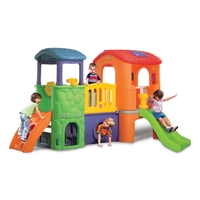Great Outdoor Activities For Kids’ Mental and Physical Wellbeing

Great Outdoor Activities For Kids’ Mental and Physical Wellbeing
Kids love playing outdoors. Whether they are playing alone in their backyard or with a group of friends at a playground, children love using their bodies to run, swing, jump, slide and tumble. Active play is beneficial for a child’s physical and mental health. Outdoor activities for kids can help them to build strength, flexibility and fine and gross motor skills. Outdoor play can also bolster confidence and give children the opportunity to learn important social skills. Many kids’ outdoor toys offer fun and innovative ways to exercise and explore.
Imaginative Play
Children love imaginative play. Sometimes children act out scenarios from their real lives, playing games like “School” “Doctor” and “Family”. These games are important because they allow children to try on adult roles and responsibilities and can help them to learn empathy as they practice looking at life from another person’s perspective. Children also use make believe to act out scenarios they find frightening or exciting. They may pretend to be orphans or imagine they are battling monsters. This type of play is also important to a child’s emotional development. It gives the child practice in dealing with big feelings and produces the confidence of knowing that, at least in the imaginary realm, they can deal with the things they are afraid of.
Many kids’ outdoor toys are perfect for imaginative play. A child’s mind can turn a large plastic or wooden playhouse into the perfect setting for a number of adventures. It may be the home where they are the mother or father. It can be the castle where they battle an ogre or rescue a prince. It can be a firehouse, restaurant, police station or creepy cottage in the woods. You can find imaginative play structures that look like castles, teepees and lemonade stands. Some have stairs, slides and climbing walls to encourage active play. Regardless of the style and features, kids love having a place that is all their own.
Water Play
Splashing around in the water is great fun on a hot summer day, but it’s also a great way to learn about the physical properties of the world. Kids can conduct endless science experiments as they dip, pour, splash and sprinkle water from a variety of containers. They can play with sand and learn the different properties of solids and liquids. They can add boats and toys to discover what makes an object float and how they can make it sink. Tots can also learn about volume, discovering that the water that fills one container will overflow another.
Water play tables are one of the best outdoor toys, and can provide endless hours of fun and learning. Some include accessories like boats, buckets and squirters. Others have a separate side for sand play. Most are built just the right size for a standing toddler. Look for one with an umbrella for added protection from the sun.
Slides
Kids have endless fun going up and down a slide. Parents are often amazed at how many times a child will repeat this activity. Climbing up builds strength and balance, and kids get a new view of the world from the top. Sliding down provides just the right amount of thrill. Kids also enjoy climbing up the slide. The slippery surface and upward slope offer a new challenge and can really exercise their arms and legs! A slide looks simple and is easy to use, but it also gives kids an opportunity to see science in action; what goes up must come down! The outdoor play equipment in public parks often includes a variety of slides, giving kids the opportunity to see how different angles and turns change the speed of a descent and the challenge of a climb.
Swings
Children of every age love swinging. Babies laugh and squeal at the gentle motion and ever-changing perspective. Older kids struggle to swing on their own, and even teens enjoy the meditative repetition of pushing themselves backward and forward, up and down. Sitting in a swing may look passive, but even when a child is being pushed by someone else they must use their muscles to hold on and balance. Learning to propel themselves requires complicated coordination of various muscle groups as kids learn to move back and forth in rhythm.
Children are never content to stick with the standard use of a swing. They love to experiment by lying on their stomachs, swinging side to side or dizzying themselves by twisting the swing tight so it will spin them in circles. These activities are fun, but also help the child learn about the world as they experience it in new ways. These experiments also reward children for their innovation and ability to think outside the box.
Sports Equipment
Many outdoor activities for kids prepare them for participation in team sports. Even toddlers can practice kicking a ball, while older kids will love learning to dribble, pass and shoot a basket or score a goal. Soccer, basketball and tennis can improve a child’s hand-eye coordination. Playing with sports equipment can also build a child’s strength, speed and large muscle coordination. No matter which sport a child practices, it can be a great workout!
Sports can also contribute to healthy emotional development. Kids learn important social skills as they work together as a team. They also learn to deal with frustration as they struggle to master a sport or skill, and gain confidence as they see themselves improving. Competition provides an opportunity to learn grace in defeat as well as victory.
Children’s bodies and minds benefit from playing outdoors. They can enjoy the fresh air and sunshine as they push their bodies to the limits and test new skills and challenges. Exercise is important for physical health, and outdoor play can build muscle, exercise the heart and lungs and increase agility, coordination and flexibility. It is also important for a child’s mental health. Playtime is essential for a child’s growth and development, and it is a great way for them to learn about their environment and the physical properties of the world around them. The best outdoor toys foster fun and activity and appeal to a child’s imagination.







